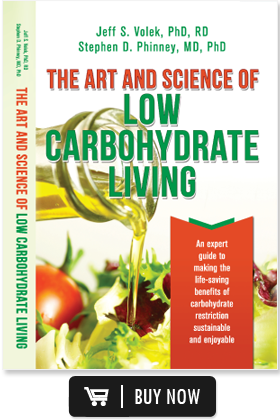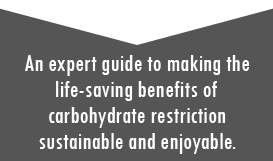The Art and Science of Low Carbohydrate Living
 In The Art and Science of Low Carbohydrate Living, we share our collective accumulated knowledge on the powerful yet contentious topic of low carbohydrate nutrition. While this topic has been hotly debated among scientists and policy-makers since the early 1970s, new research over the last 10 years offers an exciting new perspective. Thus we all stand to benefit by taking a more serious look at the issue.
In The Art and Science of Low Carbohydrate Living, we share our collective accumulated knowledge on the powerful yet contentious topic of low carbohydrate nutrition. While this topic has been hotly debated among scientists and policy-makers since the early 1970s, new research over the last 10 years offers an exciting new perspective. Thus we all stand to benefit by taking a more serious look at the issue.
Let’s be honest: our choice of diet is not just a rational medical decision; it’s complicated by personal, emotional, and cultural issues. From the rational perspective, we all agree that there is no one diet that is right for everyone. But when is carbohydrate restriction appropriate or even a preferred approach?
A major point of diversity in our population is how effectively our bodies respond to insulin, with more than half of the US population showing signs of insulin resistance. A key theme of this book is that insulin resistance is essentially metabolic carbohydrate intolerance, and these people stand to gain the most direct benefit by restricting dietary carbohydrates. If this is you, your patient, a family member, or a friend, understanding the power of low carbohydrate diets just might prevent a disease or even save a life.
If you do not already own a copy, also consider buying the recently released New Atkins for a New You coauthored by Drs Volek and Phinney. This is an updated program that is functionally consistent with The Art and Science of Low Carbohydrate Living, and it is an excellent patient-oriented source of basic instructions, food lists, and recipes for low carbohydrate living.
AMAZON REVIEWS
Best Low-carb book yet!
By Peggy A. Holloway “Dr. Peg” (Omaha, NE United States)
I absolutely love this book. I am a huge fan of Gary Taubes and have read both of his books and still highly recommend them, as do Phinney and Volek in this book. These two well-credentialed scientists have created an easy to read, clear, and well-organized book that answers all the questions about the low-carb lifestyle. I appreciate the simple, understandable explanations of the physiology behind glucose, fat, and fructose metabolism. Because I am a long-distance cyclist, I especially enjoy the fact that Dr. Phinney has done so much of his research with elite cyclists. Although I am certainly not in that class, Phinney’s research results completely validate what I have experienced as an extremely insulin-resistant, 58-year-old woman who has discovered that she can cycle for 50+ miles on back-to-back days on virtually zero carbs. My retired physician partner, who got me into cycling, is showing signs of becoming a convert to the idea of fueling with ketones and has significantly cut back on his own carbohydrate intake. It is my fervent desire that this book becomes required reading in every medical school in this country (and around the world). It is only when the medical establishment embraces the truth embodied in this small but powerful volume that we can hope to reverse the epidemic of insulin-resistance-related conditions that is plaguing developed and developing nations, and is bankrupting our health care system.
Clear, Unabridged, Hard-Hitting Nutrition Science
By Shelley D. Schlender “Shelley” (Colorado)
This is a rigorous, detailed, technical, practical, and at the same time, often surprisingly witty book. The chapter on paleolithic diets persuasively argues that fat was a bigger part of them than most anthropologists realize. The section on how saturated fats track with overall health is intriguing, and the theories and observations provided about how low carb, high fat diets reduce inflammation and the stress of free radicals and oxidation is fascinating. So is the explanation for why someone on a low-carb diet may want to increase their intake of sodium and magnesium. Note that this book WILL be controversial. As the authors write, “If you want clear, unabridged, and hard-hitting nutrition science, buy this book. If you want the mainstream consensus view, put it down gently and tip-toe quietly away.


 NEWLINEINFO CORP
NEWLINEINFO CORP